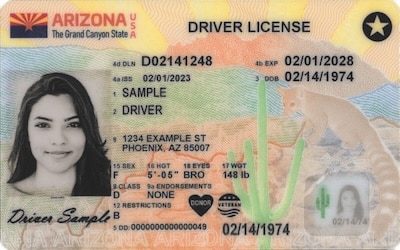Overview of Arizona ID scanning laws
Arizona has 6 laws which we consider relevant to ID verification, in addition to other laws which may related to age verification, identity verification, KYC, privacy, and biometrics.
Can you scan IDs in Arizona?
Yes. Arizona law does not regulate a business’s practice of scanning IDs.
Can you save data from a scanned ID in Arizona?
An Arizona retailer is allowed to retain and use information obtained from IDs only for the following purposes:
- Verifying a customer’s age
- Establishing a customer’s identity
- Confirming a customer’s license status to operate a vehicle
- Disclosing such information to another business for (i) verifying a check payment, (ii) evaluating creditworthiness, (iii) detecting or reducing the risk of fraud, abuse, identity theft or other crimes, (iv) collection activities, or (v) confirming that a customer has met the motor vehicle financial responsibility requirements.
- Disclosing such information to (a) the department of transportation, (b) insurance licensees, (c) notaries, (d) financial institutions if permitted by federal law, or (e) law enforcement agencies.
While Arizona law lists specific circumstances under which information obtained from an ID may be used by a retailer, those circumstances likely allow a retailer to use such information:
- for its loyalty program enrollment (for establishing a customer’s identity)
- credit application (establishing a customer’s identity or disclosing to another business for evaluating creditworthiness)
- check acceptance (establishing a customer’s identity or disclosing to another business for verifying a check payment)
- refunds (establishing a customer’s identity or disclosing such information to another business for detecting or reducing the risk of fraud, abuse, identity theft or other crimes)
Because Arizona law appears to govern the relationship between a retailer and its customers, whether it applies to other relationships, e.g., a retailer and its truck drivers, is less clear.
There are some instances in which merchants are required to record information related to identity, such as the purchase of pseudoephedrine, sale of scrap metal, or recordkeeping for notary services. ID scanning can improve the ease and accuracy of record keeping in these scenarios.
Does California offer affirmative defense for ID scanning?
Yes. Arizona offers affirmative defense for alcohol sales. A business selling liquor is expressly authorized to use a “device” to read IDs, but the law does not elaborate on it otherwise.
What types of IDs does Arizona issue?
Arizona issues drivers licenses and state IDs, including REAL ID. Additionally, Arizona has multiple mobile IDs including ID in Apple Wallet and Google Wallet.
Individual Arizona ID verification laws

ID scanning for alcohol sales
Arizona does not require ID verification for alcohol sales, however proof that an ID was examined (including by an electronic scan) is considered an affirmative defense.

ID verification for sale of controlled substances
Arizona requires that information from the buyer’s ID be entered into a state tracking system for sale of methamphetamine precursors.

ID scanning for scrap yards
Arizona requires scrapyards and pawn shops to retain a photocopy of the seller’s drivers license or ID for 1 year.

ID scanning for dispensaries
Arizona requires that cannabis dispensaries check ID but does not require electronic scanning for cannabis sales.

ID verification for financial institutions
Arizona explicitly states that financial institutions and banks may require ID verification for completion of a transaction.

ID verification for notaries
Arizona requires that information from the signer’s ID be kept in a log.

Age verification for adult websites
In 2024, Arizona governor vetoed a law which would have required electronic age verification for accessing adult websites.
Data privacy laws in Arizona
Arizona has fairly strict outlines for how PII from a scanned ID can be used, which can be read here.
Senate Bill 116 was passed in 2017 to protect consumer data including ID information and home address.
A. An entity shall not knowingly discard or dispose of records or documents without redacting the information or destroying the records or documents if the records or documents contain an individual’s first and last name or first initial and last name in combination with a corresponding complete:
- Social security number
- Credit card, charge card or debit card number
- Retirement account number
- Savings, checking or securities entitlement account number
- Driver license number or non-operating identification license number

